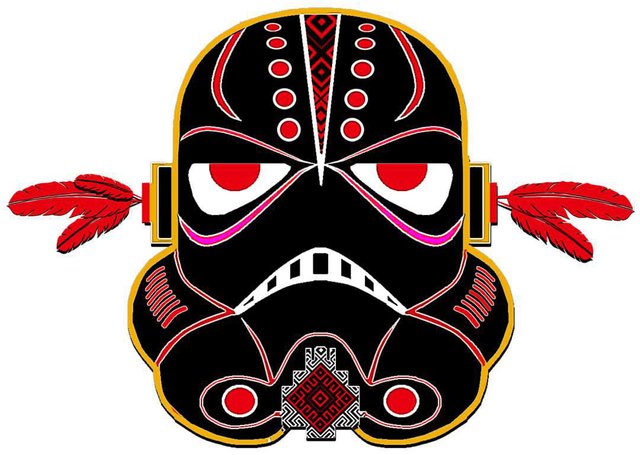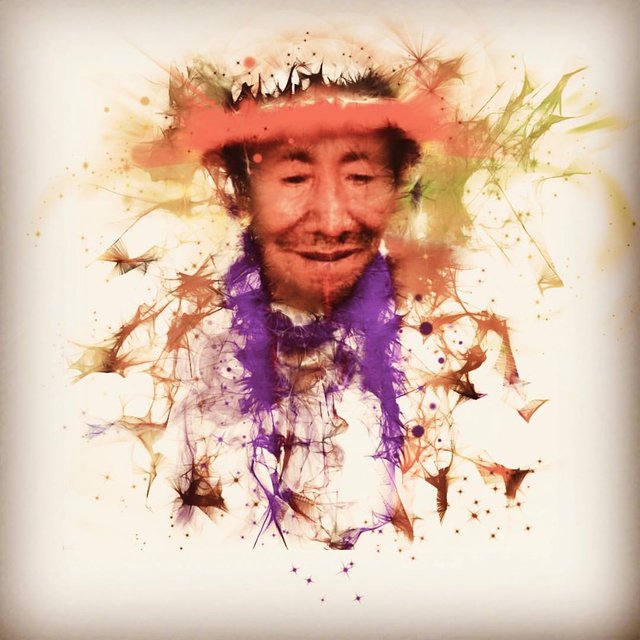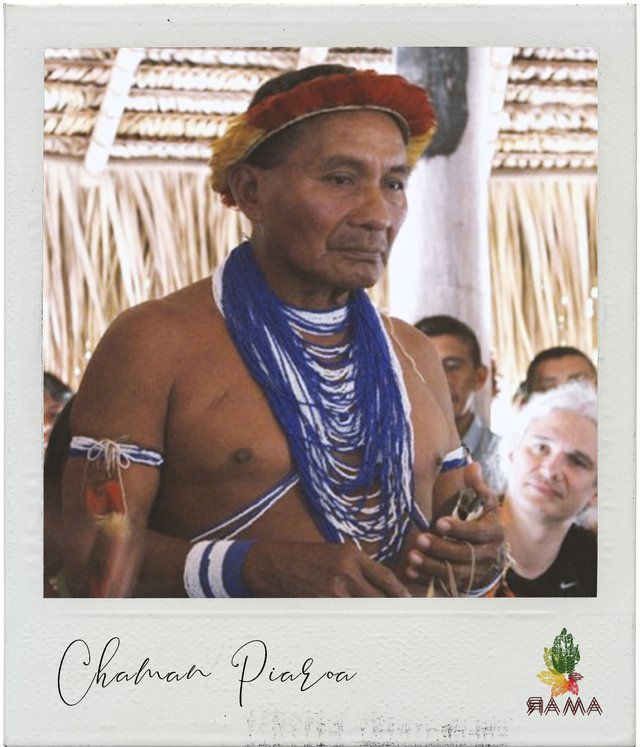
Adiwa en lengua Piaroa es un saludo, también puede significar las gracias y una afirmación. Es una palabra positiva y alegre para usarla a diario.
Adiwa in Piaroa language is a greeting, it can also mean thanks and an affirmation. It is a positive and cheerful word to use daily.

Este post está dedicado al pueblo originario Piaroa y en especial al chamán José Antonio Bolivar “El Abuelo Bolivar”, maestro al que tuve el honor de conocer y de participar en una de sus ceremonias de sanación. Lo acompaño con tres imágenes, la primera que sirve de post introductorio es una reinterpretación de la máscara de un soldado trooper, con diseño de pintura basado en el arte Piaroa. La segunda imagen es un homenaje al “El Abuelo Bolivar”, interviniendo una fotografía digital del chaman bajo el entorno de #processing y #photoshop. La terecera es una fotografai tomada por nosotros de un chamán Piarioa, que daba una charla en el 2do encuentro de culturas indígenas en Amazonas.
This post is dedicated to the original Piaroa people and especially to the shaman José Antonio Bolivar "El Abuelo Bolivar", a teacher whom I had the honor of meeting and participating in one of his healing ceremonies. I accompany it with three images, the first that serves as an introductory post is a reinterpretation of a trooper soldier's mask, with a paint design based on Piaroa art. The second image is a tribute to "El Abuelo Bolivar", intervening a digital photograph of the shaman under the environment of #processing and #photoshop. The terecera is a picture taken by us of a Piarioa shaman, who gave a talk at the 2nd meeting of indigenous cultures in the Amazon.

José Antonio Bolivar “El Abuelo Bolivar" Heredero de la Tradición Tianawa, Consejero de los Pueblos Piaroas en Puerto Ayacucho, Venezuela. “El Abuelo Bolivar” ha tenido participación en Encuentros Inter-Raciales de Cultural Indígenas en Europa, España, Holanda, Suiza, llevando el mensaje de nuestros pueblos indígenas los Piaroa o Wojtüja; se conocen a sí mismos como gente pacífica. Invitado permanente a los Encuentros Indígenas en Ottawa, Canadá. Ha sido Nombrado Representante Autentico del Linaje Ancestral de las Tradiciones de América en Perú, México, Bolivia , Estados Unidos (Navajo, Hopi).
José Antonio Bolivar “El Abuelo Bolivar” Heir of the Tianawa Tradition, Counselor of the Piaroas Peoples in Puerto Ayacucho, Venezuela. “El Abuelo Bolivar” has participated in Inter-Racial Meetings of Indigenous Cultural in Europe, Spain, Holland, Switzerland, carrying the message of our indigenous peoples the Piaroa or Wojtüja; They know themselves as peaceful people. Permanent guest to the Indigenous Encounters in Ottawa, Canada. He has been appointed Authentic Representative of the Ancestral Lineage of the Traditions of America in Peru, Mexico, Bolivia, United States (Navajo, Hopi).

“Piaroas”, también conocidos como Wõthhã, son un grupo indígena de los bosques húmedos tropicales del estado Amazonas y el Distrito Cedeño, estado Bolívar, Venezuela.
La cultura material y económica de los Piaroa es típica de la región Guyanesa-Amazónica. Su subsistencia está basada en el cultivo de rotación, la cacería, la pesca y la recolección de vegetales silvestres y micro-fauna tal como arañas, orugas, lombrices, bachacos, termitas, cicadas y larvas.
Los piaroa también son notables por lo igualitario de sus sociedades, que algunos científicos describen como anarquistas. Estos ponen un gran valor en la autonomía y libertad individuales y son conscientes de la importancia de asegurar que nadie esté bajo las órdenes de alguien más. Para esto también se preocupan de que nadie tome control sobre recursos socioeconómicos que permitan limitar la libertad de otros. La jerarquía de los piaroas es modesta y a pesar que los líderes comunales siempre son hombres, algunos expertos llegan incluso a dudar del dominio masculino sobre los habitantes.
Es destacar la fuerza cultural de los Piaroa con manifestaciones culturales y religiosas con gran contenido espiritual y del desarrollo del ser humano. Hay quienes afirman que muchos Chamanes Piaroas tiene facultades extrasensoriales como la telepatía y la predicción.
“Piaroas”, also known as Wõthhã, is an indigenous group of the tropical humid forests of the Amazonas state and the Cedeño District, Bolívar state, Venezuela. The material and economic culture of the Piaroa is typical of the Guyanese-Amazon region. Its subsistence is based on the cultivation of rotation, hunting, fishing and the collection of wild vegetables and micro-fauna such as spiders, caterpillars, worms, bachacos, termites, cicadas and larvae.
The Piaroa are also notable for the egalitarian of their societies, which some scientists describe as anarchists. These place great value on individual autonomy and freedom and are aware of the importance of ensuring that nobody is under someone else's orders. For this they also worry that no one takes control over socio-economic resources that allow limiting the freedom of others. The hierarchy of the piaroas is modest and although the communal leaders are always men, some experts even doubt the masculine dominion over the inhabitants.
It is to highlight the cultural strength of the Piaroa with cultural and religious manifestations with great spiritual content and human development. There are those who claim that many Piaroas Shamans have extrasensory powers such as telepathy and prediction.
